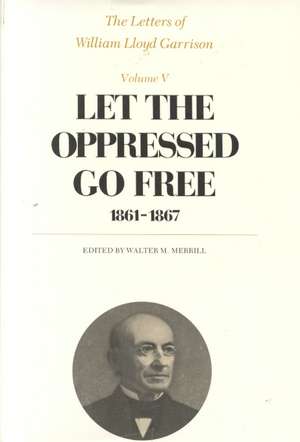The Letters of William Lloyd Garrison – Let the 1861–1867
Autor William Lloyd Garrisonen Limba Engleză Hardback – 30 iun 1990
Garrison was profoundly disturbed by the advent of war. In his correspondence, he kept military events at a distance, focusing on the morality of the conflict, an issue made the more poignant by his eldest son's enlistment in the 55th Massachusetts Regiment in 1863--the same year that his wife suffered a paralytic stroke. Gradually he became convinced that the war would effect the abolition he had sought for so many years.
Likewise his attitude toward Lincoln underwent significant changes; he moved from critic to supporter, defending the President's re-election against the arguments of fellow abolitionists. His visit with Lincoln in the White House he described as "a very satisfactory one indeed," for he was pleased with Lincoln's "spirit, and the familiar and candid way in which he unbosomed himself." With the war ended and his goal as abolitionist achieved, Garrison discontinued "The Liberator" and withdrew from the American Anti-Slavery Society. Fortunately, friends arranged for a national testimonial that provided financial security. By 1866-1867 he was enjoying an active retirement with honors at home and abroad, and a "plump and cunning" first grandchild. His letters show Garrison as a family man and curious observer as well as a reformer with a vision of a free and peaceful land.
Preț: 832.04 lei
Preț vechi: 1139.79 lei
-27% Nou
Puncte Express: 1248
Preț estimativ în valută:
159.25€ • 164.12$ • 134.45£
159.25€ • 164.12$ • 134.45£
Carte tipărită la comandă
Livrare economică 01-15 martie
Preluare comenzi: 021 569.72.76
Specificații
ISBN-13: 9780674526655
ISBN-10: 0674526651
Pagini: 642
Dimensiuni: 168 x 240 x 38 mm
Greutate: 1.18 kg
Editura: Harvard University Press
ISBN-10: 0674526651
Pagini: 642
Dimensiuni: 168 x 240 x 38 mm
Greutate: 1.18 kg
Editura: Harvard University Press
Textul de pe ultima copertă
Garrison was profoundly disturbed by the advent of war. In his correspondence, he kept military events at a distance, focusing on the mortality of the conflict, an issue made the more poignant by his eldest son's enlistment in the 55th Massachusetts Regiment in 1863- the same year that his wife suffered a paralytic stroke. Gradually he became convinced that the war would effect the abolition he had sought for so many years.
